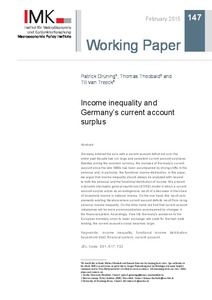Income inequality and Germany’s current account surplus
"Germany entered the euro with a current account deficit but over theentire past decade has run large and persistent current account surpluses. Besides joining the common currency, the increase of Germany’s current account since the late 1990s has been accompanied by strong shifts in the person...
| Main Authors: | , |
|---|---|
| Institution: | ETUI-European Trade Union Institute |
| Format: | TEXT |
| Language: | English |
| Published: |
Düsseldorf
2015
IMK |
| Subjects: | |
| Online Access: | https://www.labourline.org/KENTIKA-19114910124919321929-income-inequality-and-Germany’.htm |
| Summary: | "Germany entered the euro with a current account deficit but over theentire past decade has run large and persistent current account surpluses. Besides joining the common currency, the increase of Germany’s current account since the late 1990s has been accompanied by strong shifts in the personal and, in particular, the functional income distribution. In this paper, we argue that income inequality should always be analyzed with respect to both the personal and the functional distribution of income. We present a dynamic stochastic general equilibrium (DSGE) model in which a current account surplus arises as an endogenous result of a decrease in the share of household income in national income. On the one hand, this result complements existing literature where current account deficits result from rising personal income inequality. On the other hand, we find that current account imbalances will be more pronounced when accompanied by changes inthe financial system. Accordingly, if we link Germany’s accession to the European monetary union to lower exchange rate costs for German bank lending, the current account surplus becomes larger." |
|---|---|
| Physical Description: | 34 p. Digital |

